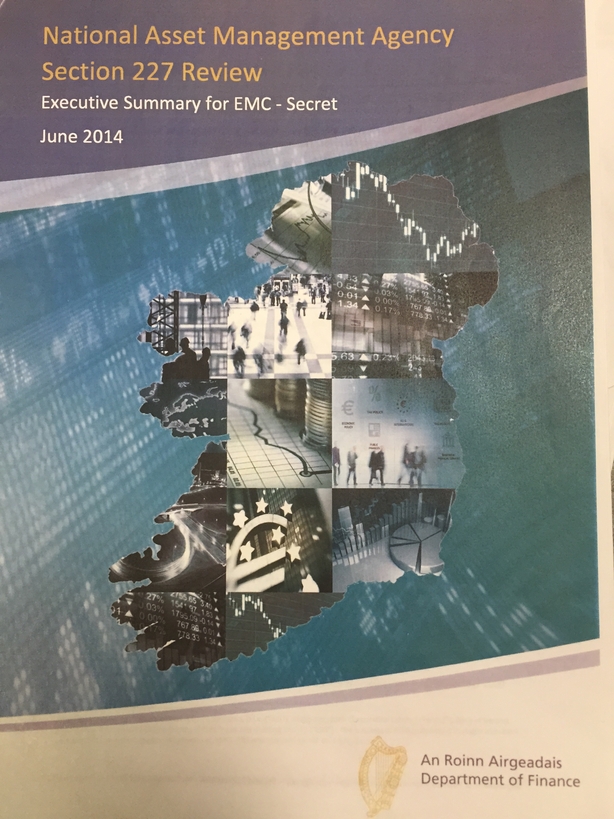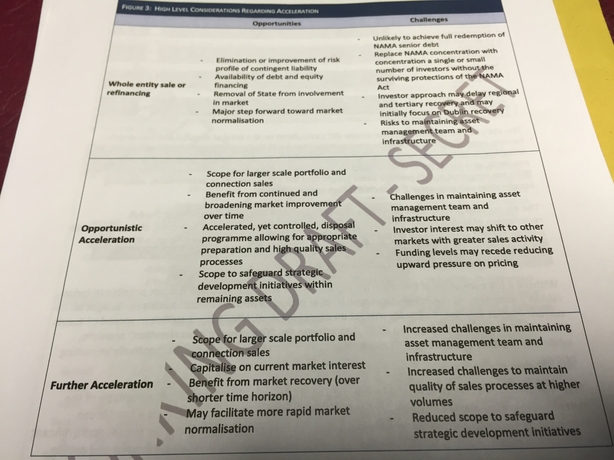The Department of Finance believes there will be a cash surplus of approximately €1bn for the taxpayer at the end of 2016, after NAMA disposes of its assets and reaches bond redemption targets.
This cash surplus, calculated on a projected growth in the property market of 3% per annum, is around twice NAMA's own estimated profit of approximately €500m.
The department gave this estimate in a working draft of a review of NAMA labelled "secret".
The draft was sent to the Economic Management Council last June and released to RTÉ News under the Freedom of Information Act.
Under the NAMA Act 2009, the Department of Finance must assess the extent to which NAMA has made progress in achieving its overall objectives and whether the continuation of the agency is necessary, while having regard for the purposes of the Act.
Speaking in the Dáil last May Minister for Finance Michael Noonan said “the strategy and timing of NAMA's wind-down” was one of the areas being examined in the review.

He also said as part of the review, he asked NAMA to evaluate its disposal timing and strategy in the context of current market demand and to explore the advantages and disadvantages of accelerating its disposal strategy.
The minister also said no decision on the matter would be taken until he received feedback from NAMA on these points and his own department's review had been completed.
Documents obtained by RTÉ News under the Freedom of Information Act show correspondence on 9 May 2014 between Chairperson of NAMA Frank Daly and Mr Noonan.
The letter outlines a strategic analysis of scenarios and options for accelerating the monetisation of the NAMA portfolio.
Mr Daly said the Board of NAMA commissioned the review from independent corporate advisory firm UBS.
The three strategic options assessed by UBS were acceleration of asset disposals and bond redemptions, refinancing of NAMA senior bonds, and enterprise sale or the sale of the NAMA portfolio in a small number of large transactions over a short period of time.

In the letter Mr Daly said that taking into account NAMA's own deliberations and advice from UBS, it was the board's view the acceleration of asset disposals and bond redemptions targets of €17bn by end 2016 would achieve the best financial outcome for the State.
In the executive summary of the Department of Finance's review sent to the EMC last June, which was also obtained by RTÉ News under the Freedom of Information Act, the advantages and disadvantages of potential acceleration strategies were analysed.
The options examined in the report were whole entity sale or Refinancing; a sale of NAMA in its entirety, opportunistic acceleration - involving asset disposals and bond redemption targets of €17bn by end 2016, and further acceleration - involving asset disposals and bond redemption targets of €19bn by end 2016.
The Department of Finance's review of NAMA was published last July and it said the agency was committed to “taking full advantage of the current strong investor interest in Irish assets and will maintain a flexible approach with a view to accelerating disposals and resulting redemptions beyond the 80% target”.
On 22 October 2014 the Board of NAMA went before the Oireachtas finance committee. In response to a question by Fianna Fáil's Finance Spokesperson Michael McGrath, NAMA'S CEO Brendan McDonagh said based on the agency's 30 June accounts and if market conditions continued as they had, he expected a cash surplus of “somewhat less than €500m”.
In the confidential working draft of the review sent to the EMC, the Department of Finance said by opting for opportunistic acceleration, not only would there be a full repayment of both senior and subordinated debt, but there would be a cash surplus of approximately €1bn for the taxpayer.
One issue highlighted by NAMA in the department's published review and also in committee meetings was the retention of its key staff.
According to the published review, NAMA's ability to achieve its objectives was based on the theory agency could retain the “required operational capacity and staffing expertise”.
The review also said any proposal to help safeguard NAMA's operational capacity and staffing expertise “should receive careful consideration in light of potentially significant value implications associated with losing key employees”.
In a statement released to RTÉ News, the Department of Finance said the Minister for Finance meets with the NAMA chairman on a regular basis, which allows them to discuss important issues regarding the agency.
The statement added in response to queries around NAMA's ability to deliver on its objectives without losing its key staff, it estimated staffing levels in NAMA “will reduce from 370 at end-2014 to 125 at the start of 2017 and 60 at the start of 2018.
“These projected staffing levels are subject to on-going review by the NAMA Board and to revision in light of changes to the Agency's strategy.”

